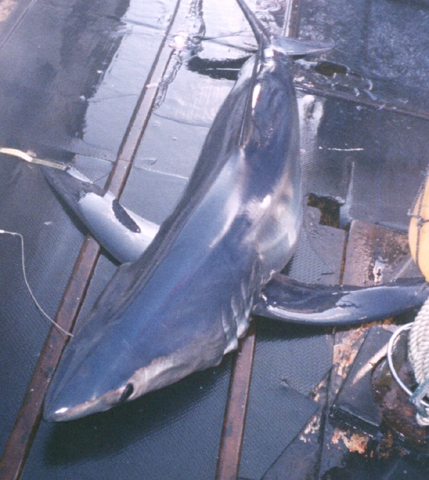| Lamnidae (Mackerel sharks or white shark) |
| 427 cm TL (male/unsexed); 417 cm TL (female) |
|
pelagic-oceanic; marine; depth range 0 - 1752 m, oceanodromous |
| Western Atlantic: Gulf Stream and Florida, USA; also Cuba. Reported from southern Brazil (Ref. 13574). Eastern Atlantic: Guinea, Ghana. Western Indian Ocean: Madagascar. Pacific Ocean: Taiwan, near Phoenix Island, and north of Hawaii (Ref. 13574). |
|
Dorsal spines (total): 0-0; Dorsal soft rays (total): 0-0; Anal spines: 0-0; Anal soft rays: 0-0. Pectoral fins about as long as head or longer, relatively broad-tipped in young and adults; snout usually narrowly to bluntly pointed, usually not acute; cusps of upper and lower anterior teeth straighter, with tips not reversed (Ref. 43278). Caudal fin lunate, with a very long lower lobe (Ref. 13574). Dark blue above, white below, with dusky markings on underside of snout, around mouth (Ref. 6581). |
| Oceanic species that probably approaches land to give birth (Ref. 13574, 58302). Epipelagic (Ref. 58302). Presumably feeds on schooling fishes and pelagic cephalopods (Ref. 247). Ovoviviparous, embryos feeding on yolk sac and other ova produced by the mother (Ref. 50449). With 2 pups in a litter (Ref. 247). Potentially dangerous because of its large size and big teeth (Ref. 13574). Utilized fresh, frozen, and dried or salted for human consumption (Ref. 247); meat (lower quality), fins (high value in adults), jaws (highly prized), skin and cartilage (Ref.58048). |
|
Endangered (EN); Date assessed: 05 November 2018 (A2d) Ref. (130435)
|
| traumatogenic |
Source and more info: www.fishbase.org. For personal, classroom, and other internal use only. Not for publication.
